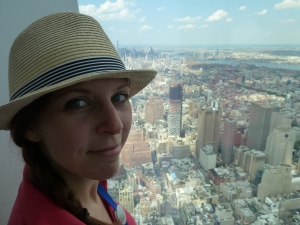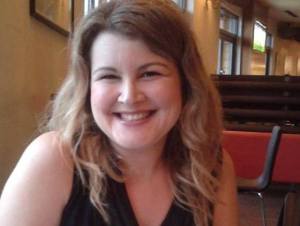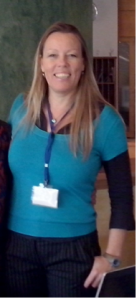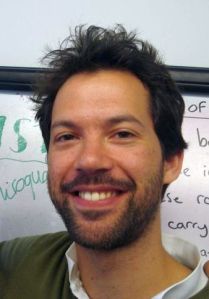This is part of a series of posts showing you all the different ways you can approach the Cambridge Delta. They are designed to help you find out more about the course and what it involves, as well as helping you to choose the right way to do it for you, your lifestyle and the time you have available. If you’ve done the Delta (or any other similar higher-level teaching course, including a Masters), and you’d like to join in, let me know by leaving me a comment or contacting me via Twitter @sandymillin.
Jenni started teaching in Poland in 2014 following a CELTA from British Council Krakow. She moved back to the UK two years later as she found love during her Christmas holiday back home. She then spent time teaching in language schools and summer schools in the UK. In 2018, she completed her Delta and currently works as an online tutor and course developer. She enjoys an #eltwhiteboard and tweets @jennifoggteach.

How did you do your Delta? How did you arrange the modules?
I did an ‘intensive’ Delta, where the course runs over 15 weeks and the modules are completed concurrently. At Leeds Beckett (formerly Leeds Metropolitan) University, you work towards completing an internal qualification – a Postgraduate Certificate in English Language Teaching and Professional Practice, which prepares you for your Delta and counts towards it (the internal LSAs are part of both qualifications).
You prepare for the Module 1 exam through a series of workshops and homework tasks as well as taking a full Delta-style exam in exam conditions. This counts towards your PG Cert. and acts as a Delta mock.
The module 2 preparation included weekly sessions with advice on writing LSAs and background essays. The work you submit becomes part of your portfolio for both Leeds Beckett and Cambridge.
In module 3, there were deadlines throughout the semester for each section, with the view that the whole piece of work is completed within 15 weeks. We then gave a 15-minute presentation on our specialism. This was interesting as we got to learn about other specialisms and could see how people approached them in different ways.
Why did you choose to do it that way?
I really wanted to do a course quickly as I found that teaching positions in the UK were generally low-paid and there was little chance of promotion without a Delta. I was already living in Leeds, within walking distance of the university, and was teaching part-time in a local language school, which meant I could teach my own class for the LSAs. It made sense to take this route. I also found the PG Cert. attractive, as it meant I could put this on my CV while I was still waiting for the results of the Delta.
What do you think you gained from doing the Delta?
I really enjoyed reading more about SLA [Second Language Acquisition] and feel I benefited from the further reading in general; this is something I couldn’t find time to do before the course. It also made me a more reflective teacher and I now take time to consider why I have planned and structured a lesson in a certain way. I also really enjoyed all the opportunities to observe my peers and teachers online. This was a great way to discover effective new ways to teach.
The intensive nature of the course meant that we bonded quickly as a class and I made several close friends. It also gave me confidence to become more present in the ELT community on Twitter.
What were the downsides of the method you chose?
It was absolutely exhausting. Doing the course in 15 weeks whilst teaching at the same time was the hardest thing I’ve ever done. It meant very early starts and late nights with every waking minute focused on reading, writing or lesson planning. The deadlines across different modules often fell on the same day too. It required insane organisation!
Also, because I wasn’t working full-time, I didn’t earn a lot of money throughout the course. I had to manage my money carefully (but really didn’t have much opportunity to spend it!).
What were the benefits of the method you chose?
From starting the course to achieving all three module certificates took 11 months. The course took place from the end of September to the start of January. We sat the exam and submitted Module 3 in June and then had to wait for the results. As we received our PG Cert. soon after the start of the year, we could put this on our CV in the meantime, which meant I managed to get a Director of Studies job in time for the summer, despite not having my Delta results yet.
What tips would you give other people doing the Delta?
If you choose to do the Delta this way, you will need to become an organisation master. I used Evernote for general to-do lists, storing my notes, saving useful websites and making sure each notepad was correctly-titled and saved in the right place. I also printed an A3 calendar where I wrote all my deadlines down and what work I needed to do each day. Deadlines tended to creep up on me so I needed an easy reference to see where I was up to.
I tried to use my weekends effectively, spending most of one day in the library, and spending the other day relaxing, cleaning, seeing family and doing some bulk cooking for the week. Thankfully, my lovely boyfriend cooked a lot during the course, which stopped me from getting scurvy.
I would also recommend doing as much work as possible before the course starts, both doing some preliminary reading from a Delta reading list (there are lots online) as well as reading about how other people approached it – this is a good place to start!
How much time per week would you estimate you needed to spend working on the Delta in the format you chose?
In this intensive course, it was a lot. I turned on my laptop to start working between 6-7am and finished around 10-11pm. We had lessons at the university from 12-5pm on Mondays and Fridays and I taught in the afternoons on the other three days of the week. I don’t want to work the number of hours out!
























